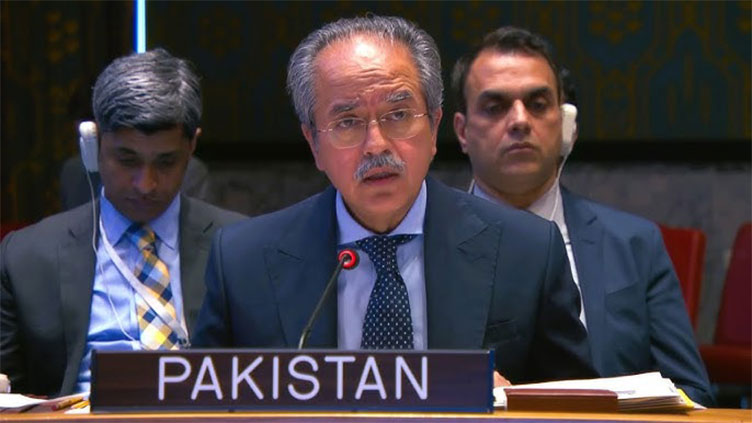Pakistan draws UNSC's attention to India's 'aggressive' naval buildup

Pakistan
Maritime security is inseparable from the broader cause of peace and stability, Ambassador Asim said
UNITED NATIONS (APP) – Pakistan brought into sharp focus of the UN Security Council India’s aggressive naval expansion and efforts seeking to assert dominance over critical waterways, as the 15-member body discussed “Strengthening Maritime Security” on Tuesday.
“We categorically reject any attempt in our region to dominate maritime spaces, undermine established legal frameworks, or marginalise the legitimate interests of other coastal states under any guise or pretext,” Ambassador Asim Iftikhar Ahmad, permanent representative of Pakistan, said in the debate convened by Greece, which holds the Council’s presidency for the month of May.
“Our oceans must be preserved as arenas for cooperation and shared prosperity, not as theatres of strategic rivalry,” the Pakistani envoy said.
“In our own immediate neighborhood, however, we have witnessed a troubling pattern of behaviour by one major country -- driven by aspirations of unchecked regional hegemony -- marked by aggressive naval expansion, and efforts seeking to assert dominance over critical waterways,” he said in an obvious reference to India.
At the outset, UN Secretary-General Antonio Guterres told the Security Council that all of humanity depends on the world oceans and seas -- from the oxygen we breathe, to the biodiversity that sustains all life, to the economies, trade and jobs supported by maritime industries.
He said that today debate shines a light on a fundamental fact: Without maritime security, there can be no global security.
In his comments, Ambassador Asim, the Pakistani envoy, said that India’s “destabilising and dangerous naval build-up is accompanied by coercive diplomacy and the systematic exclusion of neighbouring states from regional maritime security frameworks, including the Indian Ocean Rim Association (IORA)”.
Such actions, he said, undermine the maritime balance and restrict the space for inclusive cooperation.
“This same country has also displayed a concerning propensity to usurp and weaponise shared natural resources -- including trans-boundary rivers -- in flagrant breach of treaty obligations and the principles of good neighborliness,” Ambassador Asim said.
“These actions reflect a broader agenda of leveraging geography to disrupt and destabilise long-standing cooperative arrangements, particularly to the detriment of the lower riparian state that is Pakistan, and impose unilateral outcomes, in both riverine and maritime spheres.
“As a maritime nation, Pakistan views the Arabian Sea as its ‘fifth neighbour,’ integral to its economic vision and strategic orientation. Pakistan’s unique geographical positioning offers significant potential to serve as a regional trans-shipment hub enabling trade and connectivity for landlocked Central Asian countries.”
On its part, he said Pakistan has remained a committed and responsible partner in international efforts to strengthen maritime security, pointing out that the Pakistani Navy continues to contribute to Combined Maritime Forces (CMF) Task Forces conducting operations across the Gulf of Oman, Arabian Sea, and the Red Sea to counter terrorism, smuggling and piracy as well as also launched Regional Maritime Security Patrols (RMSP) to ensure a safe and secure environment in the seas.
“Our dedication to regional cooperation is also reflected in our engagement with multilateral initiatives such as the Djibouti Code of Conduct,” the Pakistani envoy said, adding that at the national level, Pakistan continue to build capacity in port security, blue economy development, maritime domain awareness, and marine conservation.
Pakistan, he said, also recognises the urgent need to address the growing climate-related risks facing the maritime and coastal systems, noting that rising sea levels, acidification, and coastal erosion pose serious threats to livelihoods, ecosystems, biodiversity, and maritime stability.
Maritime security is inseparable from the broader cause of international peace and stability, Ambassador Asim said, asserting that any attempts to instrumentalise maritime spaces for political or strategic leverage must be collectively rejected.
“Instead,” the Pakistani envoy said, “we must reaffirm our commitment to multilateralism, equity, and cooperation as the foundation for a secure and sustainable maritime future.
“Pakistan stands ready to work with all countries to protect the integrity of the maritime domain, uphold international law, and ensure that our oceans remain open, peaceful, and beneficial for all humankind.”


